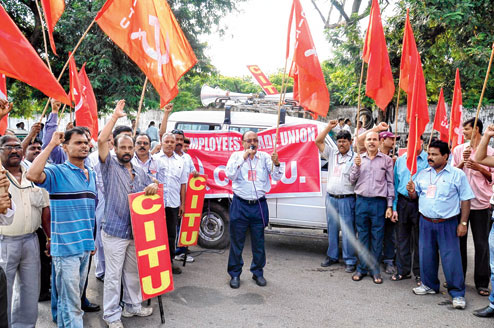 |
| Citu members organise a campaign in Rourkela ahead of the trade union elections. Picture by Uttam Kumar Pal |
Rourkela, Oct. 7: Trade union politics in the city has gathered momentum after the Durga Puja lull, with various organisations trying to tighten the grip on the ballot boxes on October 15.
“With people in a Puja mood, the campaign for the polls would have been counter-productive,” said Rourkela Shramik Sangh president Prasant Behera.
Brundaban Sahu, general secretary of the Rourkela Mazdoor Sabha, said: “During the Puja, who would listen to us and join for campaigning? Hence, we dropped the idea.”
Now after the idol immersions, roadside meetings have started and campaign vehicles carrying banners have become more visible.
On the poll day, 15,000 members of the Rourkela Steel Plant will vote for the union recognition.
The election is being held after three years and the duration for the recognition will be for two years this time, said Centre of Indian Trade Unions state secretary Bishnu Mohanty.
Last time, the total workforce of the plant was 16,453, of which 15,253 took part in the polls. The sangh, which has since got split, had won 5,262 votes. Citu came second at 4,267 and the Rourkela Mazdoor Sabha came third with 4,203 votes.
The sangh has been the recognised trade union for the past 20 years. Citu is a strong contender as it came second in the last election. The sabha, which was dislodged by the sangh, is also in the fray.
The Rourkela Ispat Karakhana Karmachari Sangh is also trying to make its presence felt.
The Rourkela Shramik Sangh is affiliated to the Indian National Trade Union Congress, while the sabha has got its attachment with the Hind Mazdoor Sabha. The Rourkela Ispat Karakhana Karmachari Sangh represents the Bharatiya Mazdoor Sabha.
The Rourkela Mazdoor Sabha, Rourkela Ispat Karakhana Karmachari Sangh and Citu manifestos have spoken about recruitment of ITI trainees and diploma-holders, removal of anti-worker agreements in cluster promotion on three yearly basis and anti-worker clause for leave encashment during superannuating, unanimous opposition to privatisation of Steel Authority of India Limited and enhancement of the daily wa ge of the contract workers.
The demographic pattern of the workforce in the plant is changing fast. At present, there are over 55 to 60 per cent of workers, who are either in the age group betw een 45 and 50 or below.
“Now, the shape of trade union politics is also changing, because we have a growing number of the young workers in the age group of below 45. For them, hopes and aspirations are different than what it had been earlier,” said Behera.
“Other than monetary benefits, they are more concerned about the safety and the ambience of the work place. They want a clean and eco-friendly work atmosphere,” Behera said.
“One finds many young faces in union offices, and this is certainly a good si gn for the movement, because we require young blood to introduce dynamism to the trade union activities,” said Dilip Pattnaik of the Rourkela Ispat Karakhana Karmachari Sangh.
One worker said they would scrutinise the pro mises made in the manifesto and then decide whom to elect.
“I will vote for that union, which will assure more work place safety,” said Pramod (name changed).











